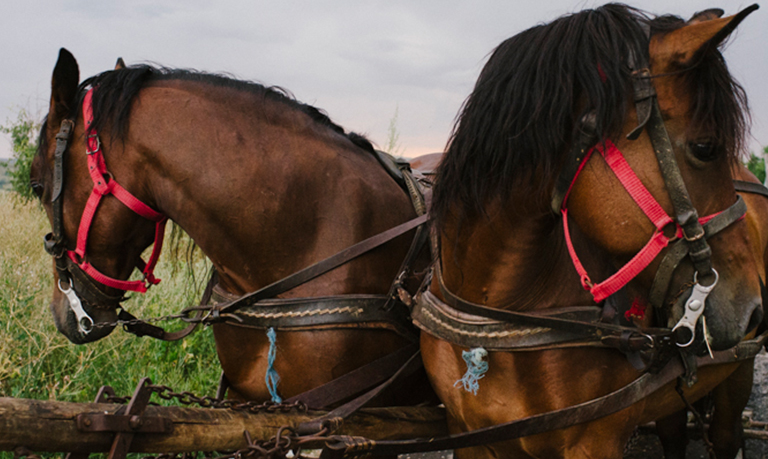Text: Valerie Präkelt
Valerie was in Romania for the first time this summer with basketball and helped where she could as a coach and companion. She wrote down her impressions right after the camp. We wanted to let some time pass before we put the text on the blog, to let our own memories sink in first. Because we are sure: Everyone who was in Bögöz this time, whether for the first, second or thirtieth time, has taken a lot of impressions and memories with them – and you usually have to process them first. But of course we don’t want to deprive you of Valerie’s text. Et voilà.
In no time at all, the plane takes us to Romania, where the heat is even more oppressive than in Germany. Everything is different here – the cabs are faster, the voices louder and the traffic busier. At least in Bucharest, the capital of Romania. Two days in the “Paris of the East,” the former stronghold of dictator Ceaușescu, before it’s time for me to go to Bögöz camp. This is my first time and I am now on the train to Sibiu, where I will meet the rest of the group. Five and a half hours on the train for just 280 kilometers – five and a half hours that show what makes Romania tick: People travel together. People chat, share food (or seats), laugh, and sometimes even shout at each other. And: A seat reservation is not worth much – on your feet, lose your seat.
The cab driver who takes me from the train station to the airport in Sibiu no longer has any teeth, but still gives me a laugh as a “German”. With the group united we go then in the bus to Bögöz, off into the Szeklerland. If it weren’t for the fact that horse-drawn carts keep coming towards us at regular intervals, we could also drive through the Tolkin Shire – it’s so green. The exception: Instead of hobbit caves, there are numerous Bracht buildings along the roadside – but most of them are unfinished. Meaning: The houses are inhabited, but not finished. The plaster is missing, sometimes even the window panes. We still haven’t found out why this is so.
Irenke will cook for us the next week, clean up after us (we wish it were different) and even take care of us. As one or the other has noticed, we took turns over the week with a nasty gastrointestinal virus, which we almost affectionately christened day virus – so long he harassed each individual.
What did I hope to get out of going to Bögöz? To be honest, I didn’t think much about it beforehand, too much stress at university and at work. Being at Irenke’s farm meant complete deceleration at first. At first. Because then the camp started, 30 children who play basketball differently well, speak different languages and all need attention – and of course deserve it.
Two excursions have had a lasting effect on me: The Visit to the Roma village and the Visit to Reni’s farm.
The Roma village was a culture shock for all of us and, quite honestly, we adults threw not only the children but also ourselves into the deep end. In the village it was dirty, the majority of the inhabitants naked. Several family members always live in the huts, without running water. The villagers drink from the river (yes exactly the one whose bathing probably gave us the gastrointestinal virus). It is dusty and insanely hot. But we are welcome – although we didn’t bring any presents. A young mother lovingly shows us her baby, a pretty, still completely toothless little thing. It is a culture shock – and that in the middle of Europe. We arrived in cabs, escorted by the police. There is no bus connection to the village (more about the visit is here). After the visit, we discussed a lot. Was it right? Did we do disaster tourism? What did our visit bring to the Roma village? And above all: What has remained with our children? Have we been able to reduce prejudices or have they perhaps only increased?
You can believe us that after the visit we adults not only talked, but also argued a bit. Personally – but this is my opinion – I wish that we repeat the visit next year, but without the police and cabs, but accompanied by Tobias, a German, who has been taking teenagers to this very village for years and doing programs together. The next day we talked about the experience together with the children. I believe that the children learned not only to appreciate their own belongings, but also that there is more than one way of life and that poverty does not necessarily mean unhappiness. Because the inhabitants of the village were really not unhappy – there was singing and playing.
A special excursion was also the visit to Reni’s farm. I am still impressed that Reni and her family spend the night on the farm every night and in case of emergency they even chase away the one or other bear or wolf. Reni is one of the kids who always brought good humor to the camp. While we Germans like to whine (and in this camp, unfortunately, often do), the Szekler camp participants sometimes seem to me to be a bit more mature. There is no whining, if you fall down, you get up. But well – what is a cut against a full-grown bear.
I was impressed once again this week that children can communicate even if they don’t speak the same language. I hope that next year we will be able to deepen this bond even more and that we will be able to push the project forward in such a way that we will be able to facilitate even more joint activities between the Szekler children and our German camp participants. Since yesterday, most of us are back in Munich, and it feels like I have been away for an eternity. I’m sure I’ll miss the German-Hungarian chatter soon (I’m still enjoying the peace and quiet) and look forward to seeing everyone next year.
Lastly, a story Sandy and Katalina told me today: As you may have noticed, István, a Roma boy who lives diagonally across the street from Irenke’s guesthouse, also attended the camp. Although István is very quiet, you immediately take him to your heart. At the end of the trip, especially we caregivers fought with one or two tears, because it is just so wonderful at Irenke’s place. Not only we: Allegedly, Ida, István’s mother, also cried. Out of gratitude, because her son was allowed to participate in the camp.

